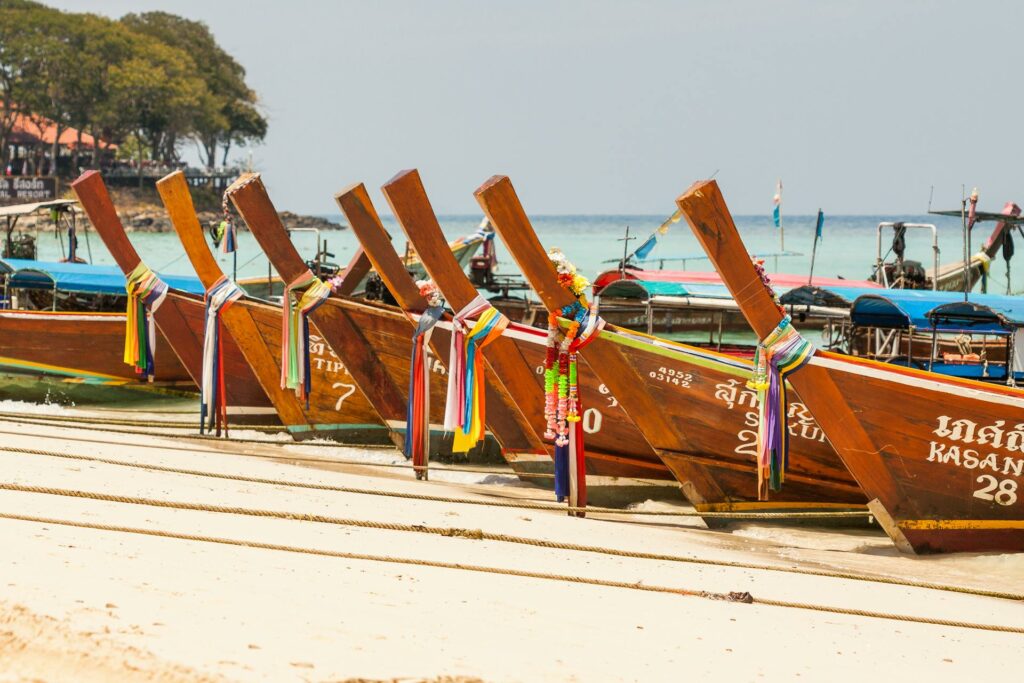The History of Cannabis in Thailand – From Ancient Times to 2024
The history of cannabis in Thailand has a rich story. Many people find the history and laws about cannabis confusing. Did you know that Thailand’s relationship with cannabis stretches back centuries? This article will guide you through its journey from ancient uses to what 2024 holds.
Starting with its early introduction by India, moving through periods of strict laws, and ending with recent changes, we will explore it all. You’ll learn how this plant went from being a key part of traditional rituals to facing severe restrictions, and now towards decriminalization and medical acceptance.
Get ready for an interesting read on the history of cannabis in Thailand!
Ancient Use of Cannabis in Thailand
In ancient times, Thailand was introduced to cannabis by India. The plant held cultural significance and was used in traditional medicine and rituals.
Introduction of cannabis to Thailand by India
Traders from India brought cannabis to Thailand centuries ago. They used sea routes for trade and shared their knowledge of this plant with the Thai people. Cannabis in Thailand soon became integrated into Thai culture because of its numerous uses in medicine, food, and religious ceremonies.
The warm climate of Thailand proved ideal for growing cannabis, which allowed it to flourish across the country.
Thai healers started using cannabis in traditional medicine to relieve pain and fatigue. Cooks also discovered that hemp seeds could enhance flavors in their dishes. Over time, religious leaders incorporated cannabis into rituals to create a sense of communion and spiritual connection among participants.
This deep cultural integration made cannabis in Thailand an important part of Thai society long before global conversations about legalization began.
Cultural significance in ancient times
Cannabis was introduced to Thailand by India and quickly became culturally significant in ancient times. It played a central role in traditional medicine, where it was used for its medicinal properties to treat various ailments.
Moreover, cannabis also had a strong presence in rituals and religious ceremonies, being considered a sacred plant with spiritual significance among the indigenous people of Thailand.
The use of cannabis in these cultural contexts demonstrates its deep-rooted connections within Thai society during ancient times. Its multifaceted applications reveal not only its historical importance but also provide insight into the early understanding of the plant’s versatile properties across different aspects of life in ancient Thailand.
Use in traditional medicine and rituals
Cannabis has been an integral part of traditional medicine and rituals in Thailand for centuries, with its usage deeply rooted in the country’s cultural heritage. The plant has been used to create various herbal remedies which have long been utilized by Thai healers to treat a wide array of ailments.
Additionally, cannabis holds significant spiritual value and is commonly incorporated into traditional ceremonies and rituals as a key element. Its usage goes beyond mere medicinal purposes, encompassing a rich tapestry of spiritual and cultural practices in Thai society.
The use of cannabis in traditional Thai medicine and rituals plays a vital role in the fabric of the nation’s history, representing an age-old tradition that continues to hold relevance today.
Criminalization and Global Influence
The Vietnam War introduced “Thai Stick,” influencing cannabis legislation worldwide. Cannabis criminalization in Thailand and its global impact led to significant changes in attitudes and laws surrounding the use of marijuana.
The Vietnam War and the introduction of “Thai Stick”
During the Vietnam War, American soldiers stationed in Thailand were introduced to “Thai Stick,” a potent form of cannabis known for its high THC content and distinctive preparation method.
Thai Stick involved binding marijuana buds around stems with hemp fibers, creating a long stick-like formation. This unique method made it easier to transport and contributed to its popularity among soldiers during the war.
The presence of American troops in Thailand led to the dissemination of this potent strain back to the United States, where it gained widespread recognition as a symbol of Southeast Asian cannabis culture.
Influence on cannabis legislation around the world
The Vietnam War brought the introduction of “Thai Stick” and increased demand for cannabis, influencing legislation worldwide. Countries were prompted to reevaluate their own drug policies as a result.
The impact was felt not only in Southeast Asia but also across various continents where the use and legalization of cannabis came under review.
As a result, countries around the world have been influenced by these changes, leading to shifts in their legislation concerning marijuana.

Recent Legal Developments in Thailand
Recent legal developments in Thailand include the decriminalization of medical use in 2018 and the current status of cannabis laws.
Decriminalization of medical use in 2018
In 2018, Thailand decriminalized the medical use of cannabis, marking a significant shift in its approach to cannabis in Thailand. This change opened the door for patients to access medical marijuana legally and paved the way for research and development into cannabis-based treatments.
The move also positioned Thailand as a potential player in the emerging global cannabis market, sparking interest in cultivation and production within the country.
Current status of cannabis laws
Thailand has recently made significant strides in its cannabis laws. In 2018, the country decriminalized the use of cannabis for medical purposes, marking a pivotal shift in policy.
This move opened up opportunities for research and development of cannabis derivatives to be used for medicinal applications within Thailand’s borders. Furthermore, these changes have generated newfound interest and investment in the modern cannabis industry within the region and beyond.
Looking ahead, it is clear that these legal adjustments are poised to reshape the landscape of Thailand’s approach to cannabis cultivation and utilization dramatically. It is expected that further developments will continue to unfold as Thailand navigates through this ever-evolving realm of leagalization of cannabis in Thailand
Future Potential of Cannabis in Thailand
The industry for cannabis in Thailand has great potential for growth, despite facing challenges in cultivation and regulations. Predictions for the future point towards a thriving cannabis market in the country by 2024.
Potential for the cannabis industry in Thailand
The cannabis industry in Thailand holds significant potential for growth and development. With the recent decriminalization of medical use, there is a growing opportunity for research, innovation, and investment in the sector.
Cultivation of high-quality strains tailored to medical purposes and addressing regulatory complexities will be vital to harnessing this potential. As global attitudes toward cannabis continue to evolve, Thailand has a unique opportunity to carve out its place in the everchanging realm of medical marijuana and industrial hemp production.
This emerging industry not only promises economic benefits but also positions Thailand as a key player in the global cannabis market. The nation’s strategic geographical location and favorable climate create an ideal environment for cultivation.
As legal frameworks further solidify, it becomes increasingly clear that Thailand has much to offer towards unlocking the secrets of cannabis production and distribution on both regional and international scales.
Moving forward, proactive efforts are indispensable in realizing the full potential of this burgeoning industry.
Challenges in cultivation and regulations
Cannabis cultivation in Thailand faces challenges due to the need for strict compliance with regulations. Ensuring quality control and standardized cultivation practices are imperative within the cannabis industry to meet regulatory standards, posing difficulties for many growers.
Cultivation regulations require extensive documentation, testing, and monitoring of crops to guarantee compliance, which can be particularly challenging for small-scale farmers.
Navigating through the complex web of regulations is a significant hurdle faced by those aiming to enter the cannabis cultivation market in Thailand. The stringent oversight from government agencies requires meticulous attention to detail at every stage of the cultivation process.
Predictions for the future of cannabis in Thailand.
The future of the cannabis industry in Thailand looks promising, with potential for significant growth. This is expected to be driven by the increasing global acceptance and legalization of cannabis, as well as the country’s favorable climate for cultivation.
However, challenges surrounding regulations and licensing are anticipated to persist, influencing the pace at which the industry develops.
As medical marijuana gains traction in Thailand, there is a likelihood that further research and innovation will lead to new applications and products in the pharmaceutical sector.
History of Cannabis in Thailand
The ancient use of cannabis in Thailand spans centuries, with its introduction by India contributing to its cultural significance and traditional medicinal applications. Criminalization and the global influence of “Thai Stick” during the Vietnam War further shaped cannabis legislation worldwide.
The recent decriminalization for medical use in 2018 marked a significant shift in Thailand’s approach to cannabis. Looking ahead, there is immense potential for the cannabis industry, although challenges exist concerning cultivation and regulations.
With predictions pointing towards a promising future, embracing this potential could drive significant advancements in various aspects of Thai society.


